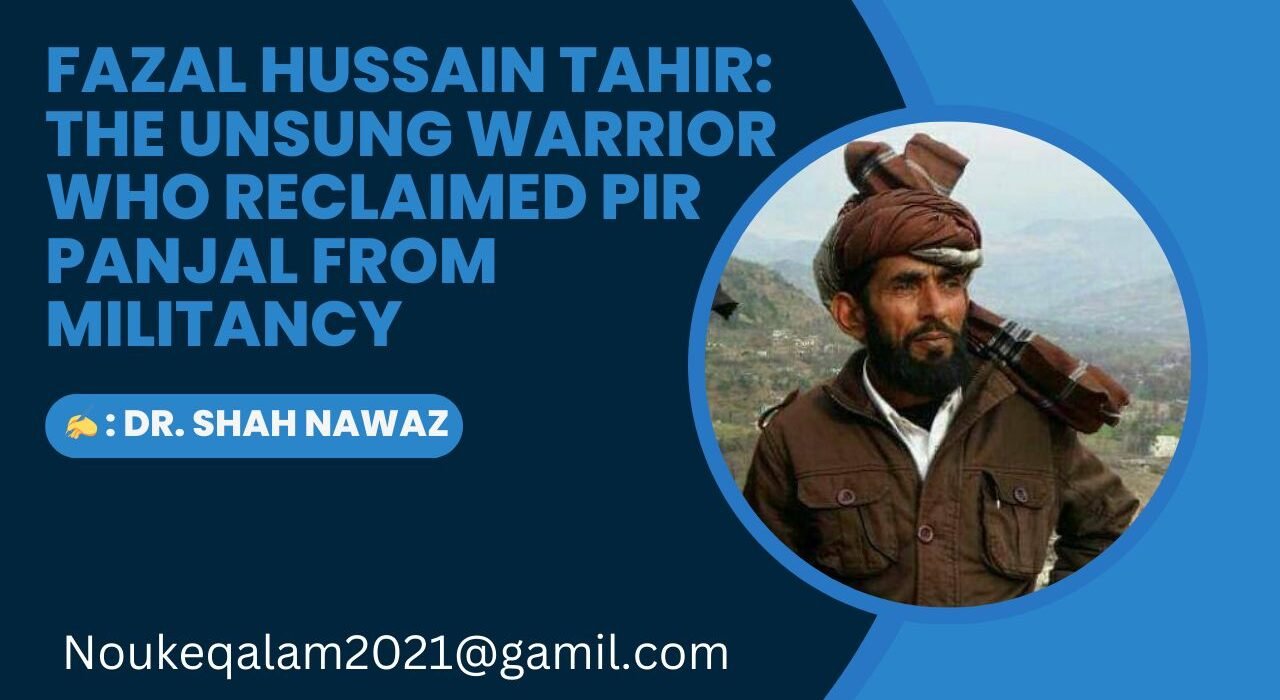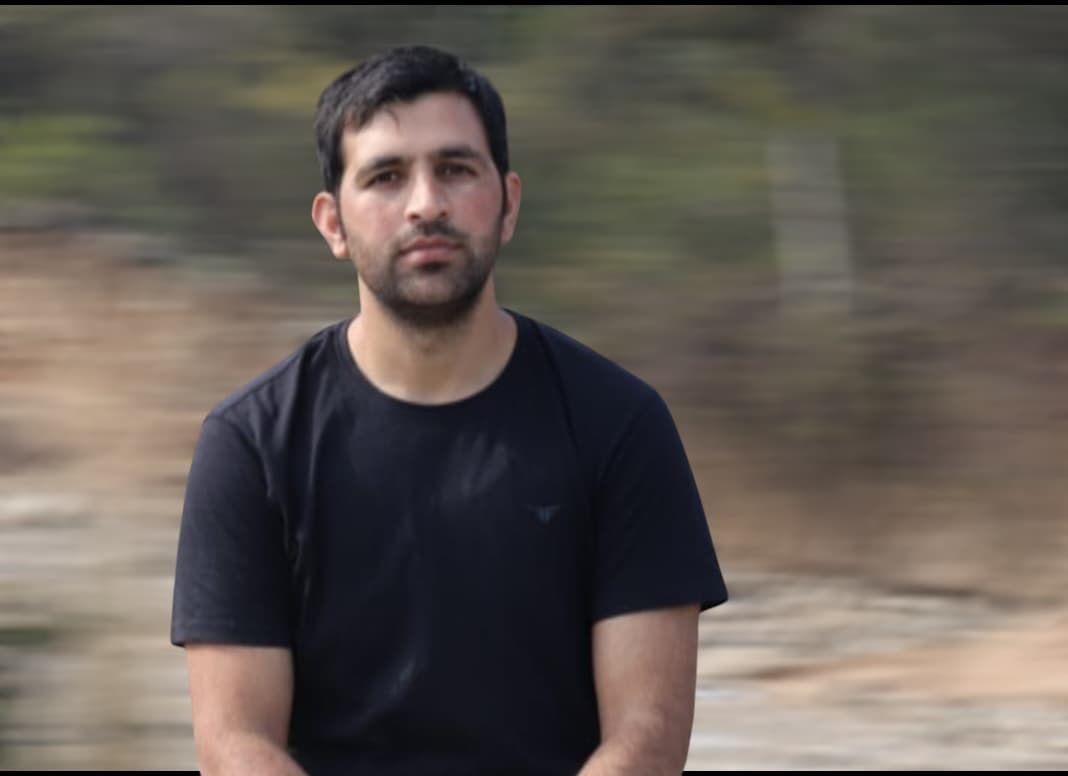The story of Fazal Hussain Tahir, an extraordinary individual from the tranquil hills of Marrah, Jammu and Kashmir, is one of valor, sacrifice, and unsung heroism. From the late 1990s to the early 2000s, his extraordinary efforts played a pivotal role in eliminating the Pakistan-sponsored militancy that plagued the Pir Panjal region of Jammu and Kashmir. Despite his monumental contributions, Tahir’s story is often overlooked, his sacrifices unrecognized and his leadership remains largely unsung. However, his resilience and commitment to restoring peace in a region gripped by violence stand as a testament to the indomitable spirit of a man who fought not for personal glory, but for the collective safety of his people and his nation.
The Seeds of Resistance:
Early Encounters with Militancy (1994-1998)
Fazal Hussain Tahir’s journey to becoming the hero of Pir Panjal began in 1994, a time when militancy was beginning to grip the region with terrifying intensity. Tahir, a native of Marrah, a small village nestled in the Surankote Tehsil of Poonch District, was initially unaware of the looming storm. His quiet life would soon be disrupted as Pakistan-backed militants began infiltrating the Indian side of the Line of Control (LoC), establishing their presence in the nearby hills.
By the mid-1990s, these militants set up training camps and made their way into villages like Hill Kaka, strategically located near the Pakistani border, and other parts of the Pir Panjal range. These areas became hotbeds for the infiltration of weapons, medical supplies and radical ideology, undermining the peace of the region. In 1998, the situation escalated when the militants began harassing local workers, including those in far-off Saudi Arabia. They would target the families of these workers, particularly the women of the Gujjar community, further amplifying the tension.
A Personal Loss That Sparked a Hero’s Resolve (2002)
While in Jeddah, Saudi Arabia, Tahir met several Pakistani laborers and through these conversations, he began to unearth the deep-seated truth of the so-called “Jihad” carried out by the militants in Kashmir. Tahir explained that this so-called religious cause was in fact a calculated effort by Pakistan to destabilize the region and torment innocent civilians. Upon hearing this, the Pakistani workers were left stunned and requested proof. Taking matters into his own hands, Tahir sent a letter, exposing the militants’ connections to Pakistan.
This letter soon found its way back to the militants in Hill Kaka, where they discovered Tahir’s involvement in revealing their operations. In a brutal act of retaliation, the militants murdered his brother, Haji Mohammad Arif, on June 10, 2002. This tragic event marked a turning point in Tahir’s life, turning his sorrow into a resolve for justice. His quest to rid his homeland of militancy gained further momentum, propelling him into a greater battle for peace.
The Genesis of a Hero’s Mission: A Journey for Justice (2002)
Devastated by the loss of his brother, Tahir knew he had to act. He met K.K. Dhillon, a retired Indian Army officer and former Indian Ambassador to Saudi Arabia, to seek advice on how to confront the militants. Together, they devised a plan to uproot the growing presence of militancy from the Pir Panjal region. Tahir, along with other brave men from his village, Haji Mohammad Qasam, Haji Zakir Hussain (Nambardar), Molvi Ghulam Hussain, and Haji Mohammad Aslam swore an oath to eliminate the menace in the region once and for all. This oath, taken in Mecca, Saudi Arabia, set Tahir on a path that would rewrite the history of the Pir Panjal region.
In late June 2002, with Dhillon’s assistance, Tahir traveled secretly from Jeddah to New Delhi, where he met with L.K. Advani, India’s then Home Minister. Advani assured him of the Indian government’s support, which set the stage for the operations that would follow. Soon after, Tahir was flown to Udhampur, where he met with Indian Army commanders and briefed them on the details of the situation in Pir Panjal.
The Indian Army, Local Gujjars and a Regional Hero (2002-2003)
Tahir’s strategy was simple but effective. He would leverage his local knowledge of the region’s difficult terrain, combined with the support of local Gujjars, to drive out the militants. With the help of Captain Subake Sharma, he underwent military training and then collaborated with the Indian Army to launch an operation in the region.
The first major breakthrough came on July 10, 2002, when Tahir offered a 30,000 rupee reward for information leading to the capture of the militants responsible for his brother’s murder. His efforts led to the identification of two key militants, Kashif and Shadakh. In a bold operation on July 12, 2002, Tahir and his team captured Kashif in the Ranjati area of Pir Panjal. In a moment of brutal justice, Tahir personally decapitated Kashif and presented the severed head to the Indian Army as a grim message to the militants.
This was just the beginning. Tahir went on to lead multiple successful encounters in the region, resulting in the neutralization of numerous militants. With each operation, his reputation grew and the people of Marrah, Hill Kaka and surrounding areas began to place their hopes in the Indian Army, even if they remained unaware of Tahir’s direct involvement.
Operation Sarpvinash: A Final Stand (2003-2004)
Tahir’s efforts culminated in the launch of Operation Sarpvinash in 2003. By then, he had successfully organized local Gujjars into a formidable fighting force, the Indian Pir Panjal Scouts (IPPS), with Tahir as their Commander. Despite the challenging geography of the region and the heavy losses sustained by his comrades, including the tragic death of Abdul Hameed, his Deputy Commander, Tahir’s leadership was instrumental in the elimination of the remaining militants.
The operation, which saw the involvement of two new Indian Army units, “15 Garwal” and “2-4 GR,” was crucial in pushing the last of the militants out of the region. By the end of 2003, the Pir Panjal region was nearly free of militant influence and by 2004, the insurgency had been effectively dismantled.
The Tragedy of Unfulfilled Promises: A Hero Unrecognized
Despite their valiant efforts, the Indian government failed to honor many of the promises made to the local Gujjars of Marrah and Hill Kaka. While some of the promised rewards, such as a memorial for the martyrs and the distribution of weapons recovered from militants were honored, key promises, including road connectivity, jobs for the families of martyrs were never fulfilled. The local people, including Tahir and his comrades, were left disillusioned by the government’s failure to uphold its commitments.
A New Mission: Giving Back to the Community
Tahir’s resilience, however, never wavered. Even after the end of the insurgency, he continued to serve his people. In 2014, when floods ravaged Jammu and Kashmir, Tahir once again proved his worth by personally delivering shrouds to the flood victims in Hill Kaka, despite the region’s isolation and the lack of transportation. This act of selflessness served as a stark reminder of Tahir’s unwavering commitment to his people, even as the Indian government turned a blind eye to their needs.
As of 2025, with retirement looming on the horizon, Tahir plans to launch an NGO trust aimed at supporting the welfare of the Gujjar community, ensuring that they receive the education, healthcare and financial support they deserve, irrespective of their religion. This would be the continuation of his legacy of service, sacrifice, and unyielding dedication to the cause of peace and justice.
Heroes Silent Struggle, A Nation’s Forgotten Debt
In the quiet hills of Pir Panjal, where the echoes of a hero’s sacrifice are still heard in the wind the story of Fazal Hussain Tahir and his fellow Gujjars from Marrah remains one of profound courage and painful neglect. Tahir, a man who laid his life on the line to reclaim his homeland from the grips of terror, stands as a symbol of unwavering commitment to the nation he served. Alongside him, countless Gujjar families, whose loved ones fought and fell for the cause, continue to carry the weight of unfulfilled promises.
Despite their invaluable contributions to the security of Jammu and Kashmir, the Indian government has failed to honor the word of innocent patriotic Gujjars from Marrah. The promises made to these brave souls rewarding their sacrifices with roads, jobs, and recognition remains a distant dream. As their efforts liberated an entire region from militancy, the very government they protected has turned its back on them, leaving them forgotten, vulnerable and disillusioned.
For Tahir, the journey didn’t end with victory; it was a fight for recognition that never came. His battle was never for fame, but for the safety of his people, a commitment that outlived his service. Yet, the question remains: who is responsible for his safety now that his service is ending in April 2025? Should the government, who benefited from his bravery, abandon him after his retirement? Who will stand by him now? Who will ensure that his sacrifices, and the sacrifices of the Gujjars from Marrah, are honored as they should be? The life of a man who gave everything for his country should never be left at risk.
In a nation that owes much to these unsung warriors, it is a heartbreaking reality that the very people who fought for its peace are left unprotected, their lives no longer held in the same esteem. As the sun sets on their years of service, it is our collective responsibility to ensure that their stories are not forgotten, that their legacies are honored and that the promises made to them are fulfilled.
Fazal Hussain Tahir and his comrades in arms remain unsung, their names not etched in stone, but their sacrifices are forever etched in the heart of every soul they saved. As we remember them, we must ask ourselves: when will we fulfill the debt owed to these heroes, whose courage turned the tide of history, only to find themselves abandoned in its shadows? His life and sacrifices will continue to inspire generations to come, proving that true heroes are often those whose stories remain hidden in the shadows, yet whose actions shape the course of history. Let their story be a call to action, for a hero’s sacrifice is never truly complete until justice is served.
The author, Dr. Shah Nawaz has PhD in Tourism and Travel Management. He can be mailed at: nawazshah1990@gmail.com
Note :.“This article is the opinion of the author; it should not be attributed to the institution.”







Shazia Chowdhary
March 9, 2025Great write up about a great personality of the nation
Khalid choudhary
March 9, 2025Plz tell me where is he now plz